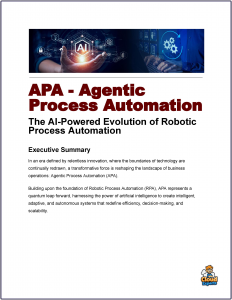Agentic Process Automation: The AI-Powered Evolution of Robotic Process Automation
Agentic Process Automation (APA) leverages LLM-based agents to automatically construct, execute, and adapt workflows, surpassing traditional RPA’s rule-based methods.
 ‘APA’ – Agentic Process Automation, represents the next evolution on from RPA – Robotic Process Automation.
‘APA’ – Agentic Process Automation, represents the next evolution on from RPA – Robotic Process Automation.
This ushers in a new era of automation technologies, the backbone of Enterprise IT transformation initiatives.
The journey of automation has been one of relentless progress, driven by humanity’s desire to streamline work, enhance efficiency, and unlock new realms of productivity.
Building upon the foundation of Robotic Process Automation (RPA), APA represents a quantum leap forward, harnessing the power of artificial intelligence to create intelligent, adaptive, and autonomous systems that redefine efficiency, decision-making, and scalability.
Agentic Process Automation (APA)
The story of APA begins with RPA (Robotic Process Automation), a technology that automated repetitive, rule-based tasks, freeing organizations from the shackles of manual processes.
RPA is a technology that, since its inception in the early 2000s, has transformed how organizations handle repetitive, rule-based tasks. RPA enabled software “bots” to mimic human actions—entering data, processing invoices, or responding to customer queries—with unprecedented speed and accuracy.
Yet, RPA’s limitations—its reliance on predefined rules and structured data—left gaps in its ability to address the complexities of modern enterprises.
Enter APA, a groundbreaking synthesis of AI’s cognitive capabilities and RPA’s operational precision. Powered by advanced machine learning, natural language processing, and real-time decision-making, APA systems are not merely task executors; they are intelligent agents capable of learning, adapting, and collaborating with humans to solve dynamic challenges.
Defining APA: The Next Frontier
Unlike RPA’s task-specific bots, APA leverages AI to create autonomous agents capable of reasoning, learning, and interacting with humans and systems in real time.
These agents can handle complex workflows, adapt to changing conditions, and even anticipate needs. For instance, an APA system in a customer service center might not only respond to routine inquiries but also analyze sentiment, escalate issues proactively, and suggest personalized solutions—all without human intervention.
Agentic Process Automation refers to a more advanced form of automation that incorporates cognitive capabilities, enabling systems to make decisions and adapt to changing circumstances autonomously. APA systems are designed to mimic human intelligence and can handle complex tasks that require reasoning and judgment.
At its core, APA is the synthesis of RPA’s operational efficiency with AI’s cognitive power. It represents a shift from automation to intelligent automation, where systems are not just executors but decision-makers. Key characteristics of APA include:
- Cognitive Capabilities: APA systems use NLP to process emails, chats, or documents, and ML to learn from historical data, enabling them to handle unstructured inputs and make informed decisions.
- Adaptability: Unlike RPA’s static rules, APA agents dynamically adjust to new scenarios, such as changes in data formats or unexpected process variations.
- Autonomy: APA systems can operate independently, orchestrating end-to-end processes with minimal human oversight, from data collection to decision execution.
- Human-AI Collaboration: APA enhances human work by providing real-time insights, recommendations, and seamless handoffs, creating a symbiotic relationship between people and technology.
Consider a practical example: in supply chain management, an RPA bot might automate order processing based on fixed rules. An APA system, however, could analyze market trends, predict demand fluctuations, adjust inventory levels, and negotiate with suppliers—all while learning from each interaction to optimize future decisions.
Overall, Agentic Process Automation represents a more advanced form of automation that combines cognitive capabilities with machine learning and adaptability. While RPA is effective in automating routine tasks, APA offers a higher level of intelligence and autonomy in handling complex processes.



